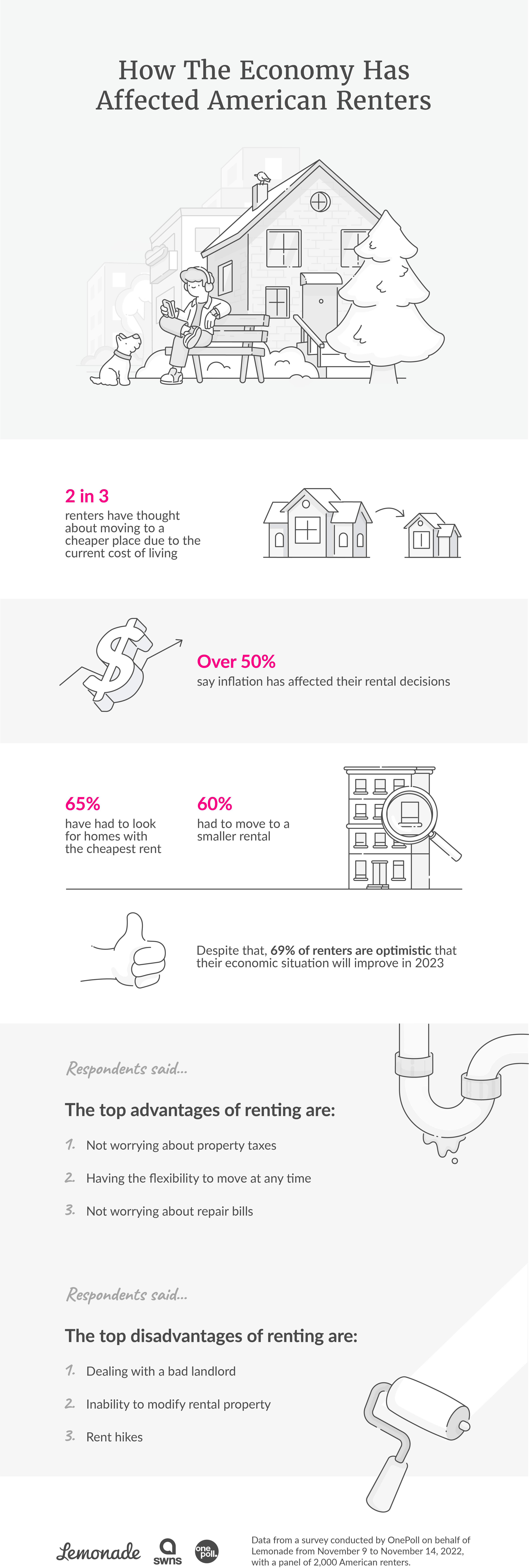Rising Rents Have Most Renters Contemplating a Cheaper Place
We polled 2,000 renters on the state of the market. Here’s what they said

We polled 2,000 renters on the state of the market. Here’s what they said

Struggling to navigate a rental market where prices keep climbing higher and higher?
You’re not alone, according to the results of a survey conducted by Lemonade and OnePoll.
With inflation at four-decade highs, and housing prices rising even faster than the overall cost of living, 63% of renters say they’ve thought about moving to a cheaper place.
Over the past five years, the median rent for an apartment in the US has surged 25%. By comparison, the Consumer Price Index (a popular measure of inflation) increased by 16% over the same period.
Understandably, this has many renters unsettled about their financial outlook. Seven in 10 renters we surveyed feel that they don’t earn enough income to make ends meet with rent, bills, and home essentials.
If you’re part of the 36% of households that rent their homes, you may well share these concerns. The post-pandemic rental market may be showing some signs of cooling off, but the economic climate remains highly turbulent. Fortunately, there are steps renters can take to ease the financial burdens they’re confronting.

Homeownership has long been a foundation of the American dream—and it’s striking that the overwhelming majority of those we surveyed believe that owning a home is now out of the question.
67% of the renters we surveyed told Lemonade that they doubt they’ll ever become homeowners.
And while many millennials are indeed entering the real estate market, younger Americans are buying homes at sharply lower rates than previous generations. By age 35, 53% of millennials own their homes—but when they were 35, 60% of Baby Boomers were homeowners, as were 70% of the Silent Generation.
A big reason? Many millennials and members of Gen Z have simply been priced out.
Rents have soared as well, of course, with 61% of renters telling Lemonade that their monthly rental payments have increased within the past year.
But while they aren’t building home equity, tenants see many advantages in renting rather than owning.

Not surprisingly, renters are even more budget-conscious in light of historically high inflation rates, with 57% saying that inflation has influenced their rental decisions.
Among that group, 65% have had to look for homes with the cheapest rent, 60% opted to move to smaller places, and 57% have tried negotiating their rent with their landlords.
While many renters are accustomed to rising rents, those who scored bargain deals during the COVID-19 pandemic—when many landlords and property managers enticed tenants with discounted rents—are experiencing whiplash.
Renters who signed such deals are now seeing their rents climb. Case in point: A staggering 84% of those we surveyed who said they signed COVID discount deals now regret them.
Even with rents reaching new heights, however, 64% of renters overall said they believe that their current homes are worth the money they’re paying. The key, of course, is making it all work within their budgets.
So what’s a renter to do?
Here are a few ways to stay on top of your finances and head off unexpected expenses:
Given the current rental market, it’s little wonder that so many renters are anxious. But with a little planning, preparation, and protection, it’s possible to achieve some much-needed peace of mind.

A quick little look under the hood, for those of you who are curious.
Lemonade commissioned a random double-opt-in survey of 2,000 American renters between November 9 and November 14, 2022. It was conducted by market research company OnePoll, whose team members are members of the Market Research Society and have corporate membership to the American Association for Public Opinion Research (AAPOR) and the European Society for Opinion and Marketing Research (ESOMAR).
Please note: Lemonade articles and other editorial content are meant for educational purposes only, and should not be relied upon instead of professional legal, insurance or financial advice. The content of these educational articles does not alter the terms, conditions, exclusions, or limitations of policies issued by Lemonade, which differ according to your state of residence. While we regularly review previously published content to ensure it is accurate and up-to-date, there may be instances in which legal conditions or policy details have changed since publication. Any hypothetical examples used in Lemonade editorial content are purely expositional. Hypothetical examples do not alter or bind Lemonade to any application of your insurance policy to the particular facts and circumstances of any actual claim.